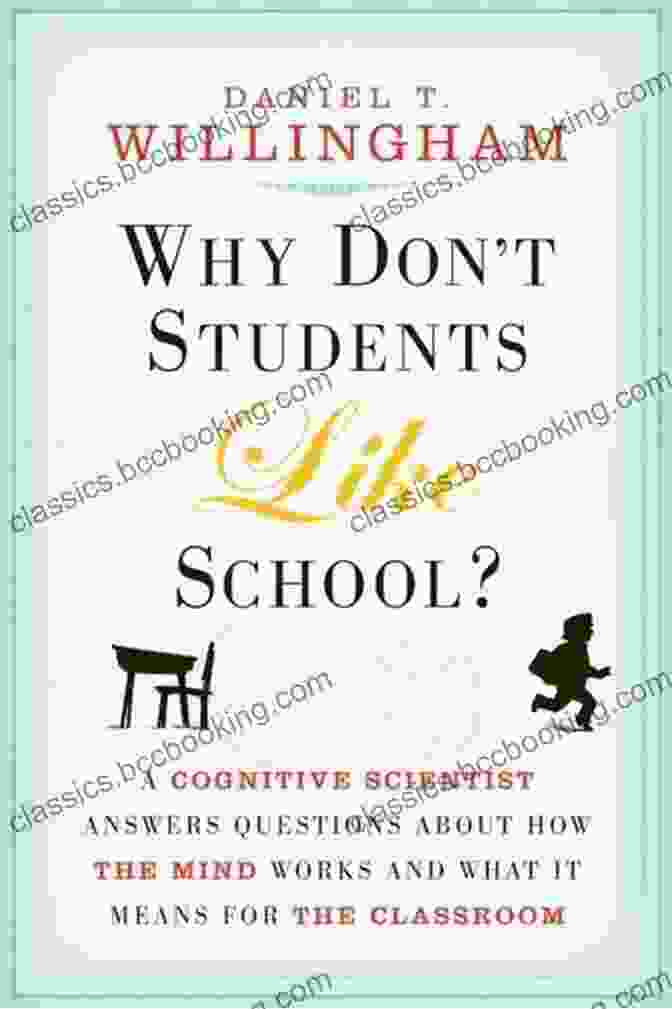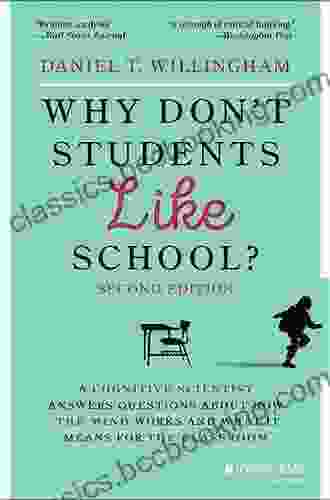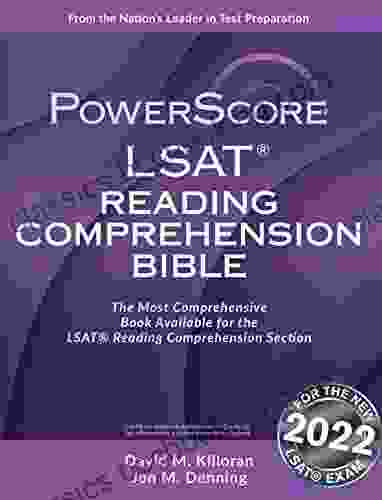Why Don't Students Like School? Unveiling the Mystery


The question of why students don't like school has perplexed educators, parents, and students alike for decades. While the reasons may vary, one thing is clear: students' disinterest in the education system is a growing concern. This article explores the complex factors behind this phenomenon, shedding light on the barriers students face and identifying potential solutions.
4.6 out of 5
| Language | : | English |
| File size | : | 32095 KB |
| Text-to-Speech | : | Enabled |
| Screen Reader | : | Supported |
| Enhanced typesetting | : | Enabled |
| Word Wise | : | Enabled |
| Print length | : | 296 pages |
| Lending | : | Enabled |
Lack of Engagement
One of the primary reasons students dislike school is a lack of engagement. Traditional teaching methods often focus on rote memorization and passive listening, which fail to capture students' attention or inspire their curiosity. As a result, students become bored and disengaged, viewing school as a tedious obligation rather than an enriching experience.
Outdated Teaching Methods
Another contributing factor is the use of outdated teaching methods that are out of touch with today's students. Many schools continue to employ lecture-based instruction, which is a passive and one-sided form of communication. This method fails to accommodate different learning styles and does not encourage critical thinking or problem-solving skills.
Irrelevance to Real Life
Students often perceive school as irrelevant to their lives outside the classroom. They may question the purpose of learning certain subjects and fail to see how it will benefit them in the future. This lack of connection can lead to disinterest and apathy, as students see no value in what they are learning.
Assessment Anxiety
For many students, assessment anxiety is a significant barrier to enjoying school. The fear of failing tests, exams, and presentations can cause immense stress and anxiety. This can lead to avoidance behaviors, such as skipping classes or procrastinating on assignments, and ultimately undermine students' academic performance.
Social Factors
Social factors also play a role in students' attitudes towards school. Bullying, peer pressure, and social isolation can create a negative school climate that makes it difficult for students to feel comfortable and engaged. Additionally, students from marginalized backgrounds may face systemic barriers that contribute to their disinterest in school.
Potential Solutions
Addressing the issue of students' disinterest in school requires a multifaceted approach that involves educators, parents, and policymakers. Here are some potential solutions:
- Foster Engagement: Engage students through interactive learning methods, hands-on activities, and projects that connect with their interests and real-world experiences.
- Update Teaching Methods: Transition from traditional lecture-based instruction to more student-centered approaches that emphasize critical thinking, problem-solving, and collaboration.
- Make Learning Relevant: Connect learning to students' lives outside the classroom by showing them how the concepts they learn apply to real-world situations.
- Reduce Assessment Anxiety: Implement alternative assessment strategies, provide students with ample support and feedback, and create a positive learning environment where mistakes are viewed as opportunities for growth.
- Address Social Factors: Implement anti-bullying policies, create inclusive school cultures, and provide support services for students from marginalized backgrounds.
The issue of students' disinterest in school is a complex one with multiple contributing factors. Addressing this issue requires a collaborative effort among educators, parents, policymakers, and students themselves. By fostering engagement, updating teaching methods, making learning relevant, reducing assessment anxiety, and addressing social factors, we can create a more positive and enriching school experience for all students.
For a deeper exploration of this topic, I highly recommend the comprehensive book "Why Don't Students Like School?" This book provides a wealth of research-based insights and practical strategies to help educators, parents, and students overcome the challenges associated with student disinterest.
Together, we can unlock the mystery of why students don't like school and create a future where all students are engaged, passionate, and empowered learners.
4.6 out of 5
| Language | : | English |
| File size | : | 32095 KB |
| Text-to-Speech | : | Enabled |
| Screen Reader | : | Supported |
| Enhanced typesetting | : | Enabled |
| Word Wise | : | Enabled |
| Print length | : | 296 pages |
| Lending | : | Enabled |
Do you want to contribute by writing guest posts on this blog?
Please contact us and send us a resume of previous articles that you have written.
 Book
Book Novel
Novel Page
Page Chapter
Chapter Text
Text Story
Story Genre
Genre Reader
Reader Library
Library Paperback
Paperback E-book
E-book Magazine
Magazine Newspaper
Newspaper Paragraph
Paragraph Sentence
Sentence Bookmark
Bookmark Shelf
Shelf Glossary
Glossary Bibliography
Bibliography Foreword
Foreword Preface
Preface Synopsis
Synopsis Annotation
Annotation Footnote
Footnote Manuscript
Manuscript Scroll
Scroll Codex
Codex Tome
Tome Bestseller
Bestseller Classics
Classics Library card
Library card Narrative
Narrative Biography
Biography Autobiography
Autobiography Memoir
Memoir Reference
Reference Encyclopedia
Encyclopedia Debbie J Jenkins
Debbie J Jenkins David C Korten
David C Korten David Pere
David Pere Dano Ybarra
Dano Ybarra Deborah Diesen
Deborah Diesen David L Roll
David L Roll David Jenyns
David Jenyns David Ehrlichman
David Ehrlichman David Alloway
David Alloway David Carli
David Carli David Hine
David Hine David King
David King David Halberstam
David Halberstam David Birch
David Birch David E Lowe
David E Lowe David Duford
David Duford Danika Stone
Danika Stone David Taylor
David Taylor David M Killoran
David M Killoran Dave Cutcher
Dave Cutcher
Light bulbAdvertise smarter! Our strategic ad space ensures maximum exposure. Reserve your spot today!
 Vladimir NabokovFollow ·8.2k
Vladimir NabokovFollow ·8.2k Shannon SimmonsFollow ·9.5k
Shannon SimmonsFollow ·9.5k Salman RushdieFollow ·13.3k
Salman RushdieFollow ·13.3k Lucas ReedFollow ·12.1k
Lucas ReedFollow ·12.1k Darrell PowellFollow ·12.6k
Darrell PowellFollow ·12.6k Chase SimmonsFollow ·12.9k
Chase SimmonsFollow ·12.9k Griffin MitchellFollow ·10.6k
Griffin MitchellFollow ·10.6k Henry JamesFollow ·17.6k
Henry JamesFollow ·17.6k

 Cameron Reed
Cameron ReedHow to Know When Language Deceives You
Unmasking the Power of...

 Robbie Carter
Robbie Carter50 Things To Know About Planning Home Schooling...
: The Power of Hands-On Learning Embarking...

 Julio Cortázar
Julio CortázarCalculus: Single and Multivariable, 8th Edition — The...
Calculus is the...

 Jaime Mitchell
Jaime MitchellBunnicula and Friends: A Spooktacular Tale of Mystery and...
In the quaint little town of Celeryville,...

 Josh Carter
Josh CarterPeppa Easter Egg Hunt: Join Peppa Pig on an...
Get ready for...

 Donovan Carter
Donovan CarterBoy Called Dickens: A Journey into the Childhood of a...
Delving into the...
4.6 out of 5
| Language | : | English |
| File size | : | 32095 KB |
| Text-to-Speech | : | Enabled |
| Screen Reader | : | Supported |
| Enhanced typesetting | : | Enabled |
| Word Wise | : | Enabled |
| Print length | : | 296 pages |
| Lending | : | Enabled |












